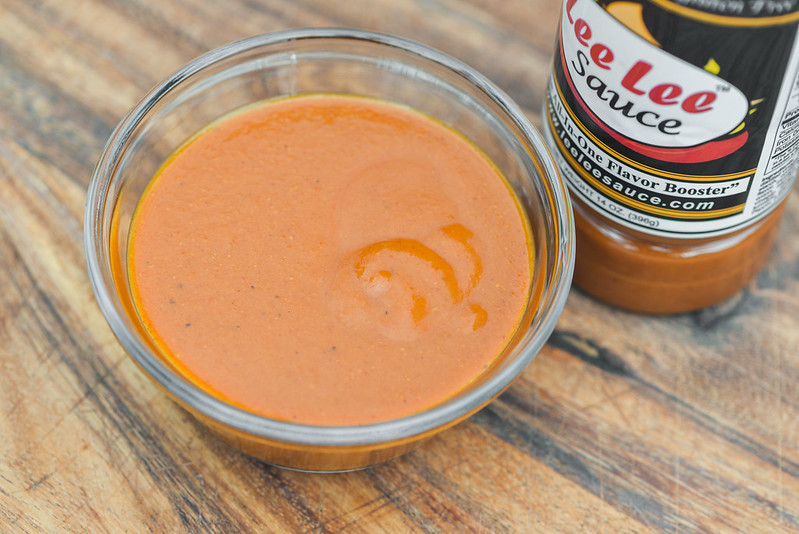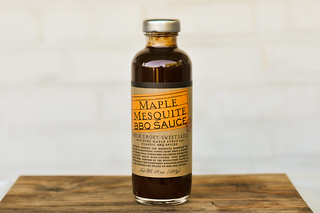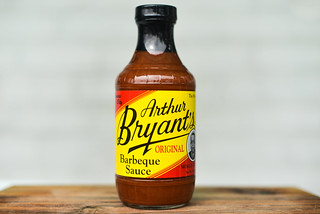Lee Lee Sauce

Background
Lee Barnes is the creator of this sauce, getting it's "Lee Lee" name from his "Grands" nickname for him. Lee developed this sauce after being unhappy with most all grilling sauces he tried that were either too sweet, too spicy, or burned over the fire. While he shared the sauce with friends and family and brought it to cookouts to great acclaim, he resisted the calls to bottle and sell it until he was in retirement. It wasn't until after some sufficient praise and nudging from a chef friend dubbed "Captain Joe" did Lee seriously consider bringing it to market. Lee did some testing of the sauce and realized there was an audience for it, which brings us to today, where the sauce is made out of Opp, Alabama and sold online and in some speciality barbecue shops.
Aroma
A spiced, tangy mustard smell is the first thing to hit in the aroma of this sauce. While pungent mustard is in the forefront, there's also a sweet tomato sitting right behind it, which aids in the creation of a more standard barbecue base. The spices in the aroma are layered and prominent, with peppers being the strongest and hinting at some underlaying heat, but the standard garlic and onion powders are also there, rounding out the robust profile.
Thickness & Texture
This rusty orange sauce is semi-glossy and has a light texture to it. It is opaque, but its light hue makes it easy to see lots of spices in small black, white, and orange specs. The sauce's thickness sits just below the medium mark and from a suspended spoon it falls first in a large drip that's followed by a quick, uneven pour. The stream then changes to two or three slow drips and ceases, leaving a medium coating of sauce left clinging to the silverware.
Out of the Jar
The first taste of this sauce is incredibly tart. That strong vinegar tang mixes with mustard next which dials up the tartness while adding in some sharpness and pungency. As the sauce settles on the tongue, there's fleeting tastes of tomato and sugar that were more upfront in the aroma, while the spices hold more power, providing a garlicky and oniony flavor that melds with a little earthy pepper. As the sauce leaves the mouth, the mustard and vinegar both ramp up a bit and the peppers add a mellow spiciness to leave a tongue tingling mixture of tartness and heat.
Slathered & Cooked
This sauce coated the chicken in a medium, slightly uneven layer that baked down well over indirect heat. When moved directly over the fire, there was both minimal sauce loss and caramelization. The final coating of sauce looked notably drier than your average product with its matte appearance. The flavor remained fairly consistent with out of the jar, having a strong tang and mustard pungency. The heavy amount of mustard equated to a little bit of grittiness to the sauce, but to a lesser degree than many other mustard-based sauces I've tried. That bit of heat tasted out of the jar built up upon multiple bites, giving the chicken a little kick by the time I was done eating the entire leg.
Put to Use
The Lee Lee Sauce website mentioned that Lee Barnes ended up creating his own sauce because everything was either too sweet or too spicy for his tastes, and also masked the flavor of meats to a fault. This sauce certainly feels like a solution to that, and if you have the same feeling as Lee about most barbecue sauces, then this just might be for you. It trades the familiar sweet tomato profile for a very acidic and pungent mustard-based taste that didn't burn at all over the flames. For me, that intense flavor was pushed to a point that it did overpower the chicken just a tad, but I think it would be a perfect match for slightly more flavorful meats like pork and beef—I can see this tasting especially good on well seasoned ribs. Just a tad more sugar would have put this sauce a notch higher in my mind, but I also like sweet and spicy sauces and Lee Lee Sauce is definitely developed for the palate that bends to the tart.




